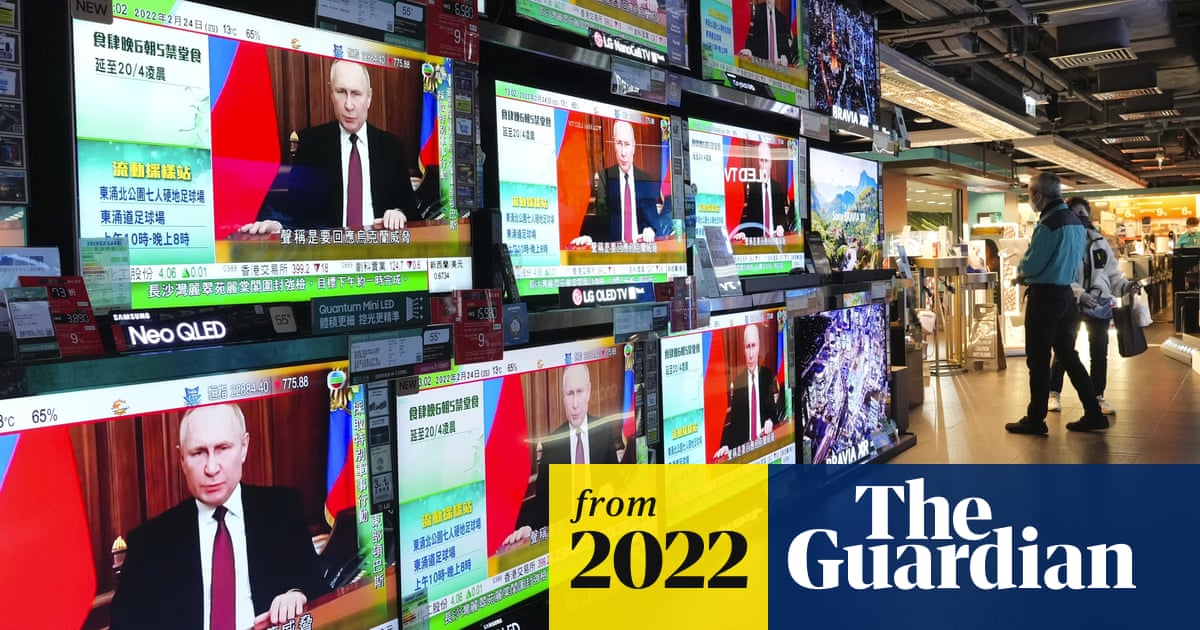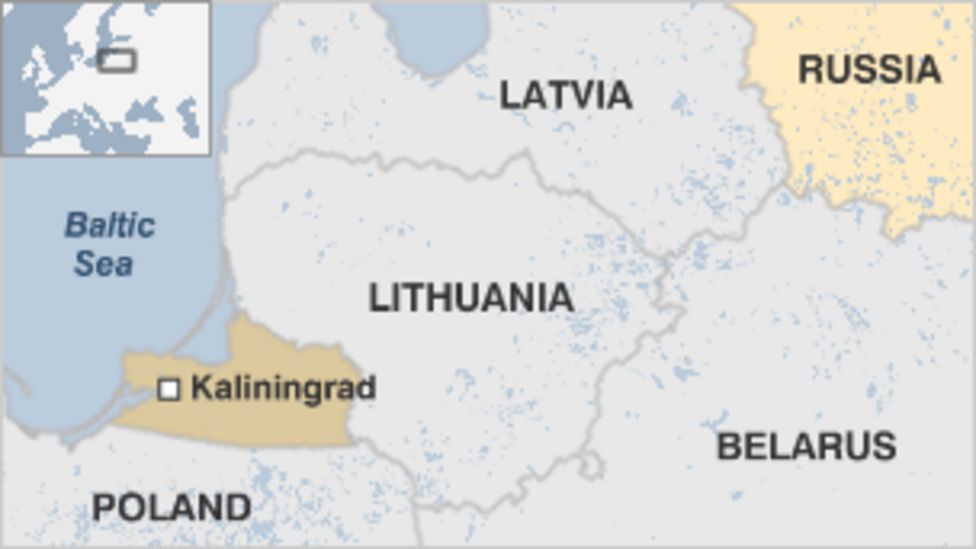Bjays92
Senior Member
Not to keep piling on to this subject but...

 www.theguardian.com
www.theguardian.com
I am very very concerned about the implications of this. I know people say that Russia has no point to engaging NATO and it's true that neither Russia nor China have really anything to gain from becoming directly involved in conflict with NATO. It's clear power is incredibly centralized in both countries though, with decision making resting almost entirely in the hands of Xi and Putin. So the question of engaging NATO or the United States for that matter, goes beyond national interest and gets into the worldviews or perceptions of these two particular individuals who have an incredible amount of power and resources at their own personal and unilateral disposal.
Both Putin and Xi fundamentally want to push back against American hegemony and both Russia and China have a history of significant regional and global influence that has been undermined by the west in the past century. For China especially, they see now as their chance to begin to regain their historical footing and influence on the global stage. So far that's been largely pragmatic, with China occasionally throwing its weight around to shape individual nations and companies policies around Chinese interests thanks to their newfound leverage. To this end, China has been measured in how it has been using this influence by and large, though they have been getting more assertive around issues of territorial integrity (think Hong Kong and Taiwan). Up until now, how that increased assertiveness would pan out in the long run was largely unknown, particularly in relation to retaking Taiwan, and pushing American influence out of the indo pacific. China for their part would seem to have a preference for this transition to happen peacefully, as peace is better for everyone, especially the Chinese people, which is likely why by and large China has been restrained in flexing its muscle as to not provoke anything. This peaceful approach is also based on the Chinese belief that US and western power is (or was) in decline. Rightly or wrongly, Beijing had assumed that their overtaking of the US was inevitable and therefore they could bide their time in realising their regional and global ambition, while their challengers continued to diminish. They also leveraged the western markets and international order to become powerful in the first place, meaning their global interdependence is still high, also tempering their potential responses.
Of note, we talk about western decoupling from China, but China for its part has also been driving decoupling even while publicly saying otherwise, as a means to insulate themselves from potential economic repercussions as much as possible. They see their economy as large enough to be self sustaining at this point, and the BRI gives them considerable influence and market power in Southeast Asia as well as emerging countries in the ME and Africa. This decoupling has already lead to China restricting Chinese companies from listing overseas (even as the US is seeking to prevent their listings) as well as reduce their trade need from other countries (think energy independence, semiconductors etc). They are trying to create onshore production of all their vital needs, a transition that is well underway but far from complete.
Putin for his part does not have anywhere near the power China does, and so he almost certainly knows he will never usurp the West. Given he sees the West as an enemy, if he can't usurp it, at the very least he can take it down, and bring it down with him if he has to. Russian attempts to divide the Western world have been in plain sight for years, especially since the election of Trump, and Putin cannot have been expecting this level of Western unity.
So this is where we likely see both Putin and Xi's calculuses fundamentally shift. Putin got a united response he wasn't expecting, he clearly cares nothing of his people or really his country given the state it is in at this point, so it would not be far fetched to assume that his fundamental goal at this point is to bring down the West with him. That's why he's being so reckless, upping the readiness of his nuclear arsenal, being brazen around nuclear facilities in Ukraine etc. He wants to goad the West into a war, without "directly" starting it, to play into his own propaganda goals (which extend far beyond Russia). Putin's threats are not bluffs, they are a result of his mindset.
China on the other hand, now has much less wiggle room as well. Xi also wants to see the fall of the Western order, which has been reinvigorated thanks to Putin's invasion. This is likely leading to a rethink that the natural decline of the West is inevitable. If that assumption is no longer informing Chinese decision making, then backing Russia makes sense, as it is now the best way to bring down US hegemony. People talk about China playing the long game, but they ignore that China doesn't actually have unlimited time at their disposal. They have a massive demographic problem that is virtually unfixable at this point, which means their window to act is sooner rather than later. My fear is they've already made this recalculation and believe the natural decline of the Western order is no longer inevitable within the next 10-20 years, meaning purely from Xi's point of view (not a view of what's best for the Chinese nation) backing Russia in this conflict now makes sense and if it spirals out of control so be it, as this confrontation would be inevitable at some point or another anyway.
I'm sorry for what is essentially a short essay lol, I really hope I'm wrong in this, but there are very few alternative explanations as to why China would be willing to throw considerable weight behind Russia.
Obviously there is still room for China to change course, this is purely an assessment of why China may feel compelled to support Russia and what that would mean on a broader scale.

China has already decided to send economic aid to Russia in Ukraine conflict, US officials fear
Jake Sullivan’s Rome meeting with Chinese counterpart left US officials pessimistic about steering Beijing away from backing Moscow
I am very very concerned about the implications of this. I know people say that Russia has no point to engaging NATO and it's true that neither Russia nor China have really anything to gain from becoming directly involved in conflict with NATO. It's clear power is incredibly centralized in both countries though, with decision making resting almost entirely in the hands of Xi and Putin. So the question of engaging NATO or the United States for that matter, goes beyond national interest and gets into the worldviews or perceptions of these two particular individuals who have an incredible amount of power and resources at their own personal and unilateral disposal.
Both Putin and Xi fundamentally want to push back against American hegemony and both Russia and China have a history of significant regional and global influence that has been undermined by the west in the past century. For China especially, they see now as their chance to begin to regain their historical footing and influence on the global stage. So far that's been largely pragmatic, with China occasionally throwing its weight around to shape individual nations and companies policies around Chinese interests thanks to their newfound leverage. To this end, China has been measured in how it has been using this influence by and large, though they have been getting more assertive around issues of territorial integrity (think Hong Kong and Taiwan). Up until now, how that increased assertiveness would pan out in the long run was largely unknown, particularly in relation to retaking Taiwan, and pushing American influence out of the indo pacific. China for their part would seem to have a preference for this transition to happen peacefully, as peace is better for everyone, especially the Chinese people, which is likely why by and large China has been restrained in flexing its muscle as to not provoke anything. This peaceful approach is also based on the Chinese belief that US and western power is (or was) in decline. Rightly or wrongly, Beijing had assumed that their overtaking of the US was inevitable and therefore they could bide their time in realising their regional and global ambition, while their challengers continued to diminish. They also leveraged the western markets and international order to become powerful in the first place, meaning their global interdependence is still high, also tempering their potential responses.
Of note, we talk about western decoupling from China, but China for its part has also been driving decoupling even while publicly saying otherwise, as a means to insulate themselves from potential economic repercussions as much as possible. They see their economy as large enough to be self sustaining at this point, and the BRI gives them considerable influence and market power in Southeast Asia as well as emerging countries in the ME and Africa. This decoupling has already lead to China restricting Chinese companies from listing overseas (even as the US is seeking to prevent their listings) as well as reduce their trade need from other countries (think energy independence, semiconductors etc). They are trying to create onshore production of all their vital needs, a transition that is well underway but far from complete.
Putin for his part does not have anywhere near the power China does, and so he almost certainly knows he will never usurp the West. Given he sees the West as an enemy, if he can't usurp it, at the very least he can take it down, and bring it down with him if he has to. Russian attempts to divide the Western world have been in plain sight for years, especially since the election of Trump, and Putin cannot have been expecting this level of Western unity.
So this is where we likely see both Putin and Xi's calculuses fundamentally shift. Putin got a united response he wasn't expecting, he clearly cares nothing of his people or really his country given the state it is in at this point, so it would not be far fetched to assume that his fundamental goal at this point is to bring down the West with him. That's why he's being so reckless, upping the readiness of his nuclear arsenal, being brazen around nuclear facilities in Ukraine etc. He wants to goad the West into a war, without "directly" starting it, to play into his own propaganda goals (which extend far beyond Russia). Putin's threats are not bluffs, they are a result of his mindset.
China on the other hand, now has much less wiggle room as well. Xi also wants to see the fall of the Western order, which has been reinvigorated thanks to Putin's invasion. This is likely leading to a rethink that the natural decline of the West is inevitable. If that assumption is no longer informing Chinese decision making, then backing Russia makes sense, as it is now the best way to bring down US hegemony. People talk about China playing the long game, but they ignore that China doesn't actually have unlimited time at their disposal. They have a massive demographic problem that is virtually unfixable at this point, which means their window to act is sooner rather than later. My fear is they've already made this recalculation and believe the natural decline of the Western order is no longer inevitable within the next 10-20 years, meaning purely from Xi's point of view (not a view of what's best for the Chinese nation) backing Russia in this conflict now makes sense and if it spirals out of control so be it, as this confrontation would be inevitable at some point or another anyway.
I'm sorry for what is essentially a short essay lol, I really hope I'm wrong in this, but there are very few alternative explanations as to why China would be willing to throw considerable weight behind Russia.
Obviously there is still room for China to change course, this is purely an assessment of why China may feel compelled to support Russia and what that would mean on a broader scale.
Last edited:







